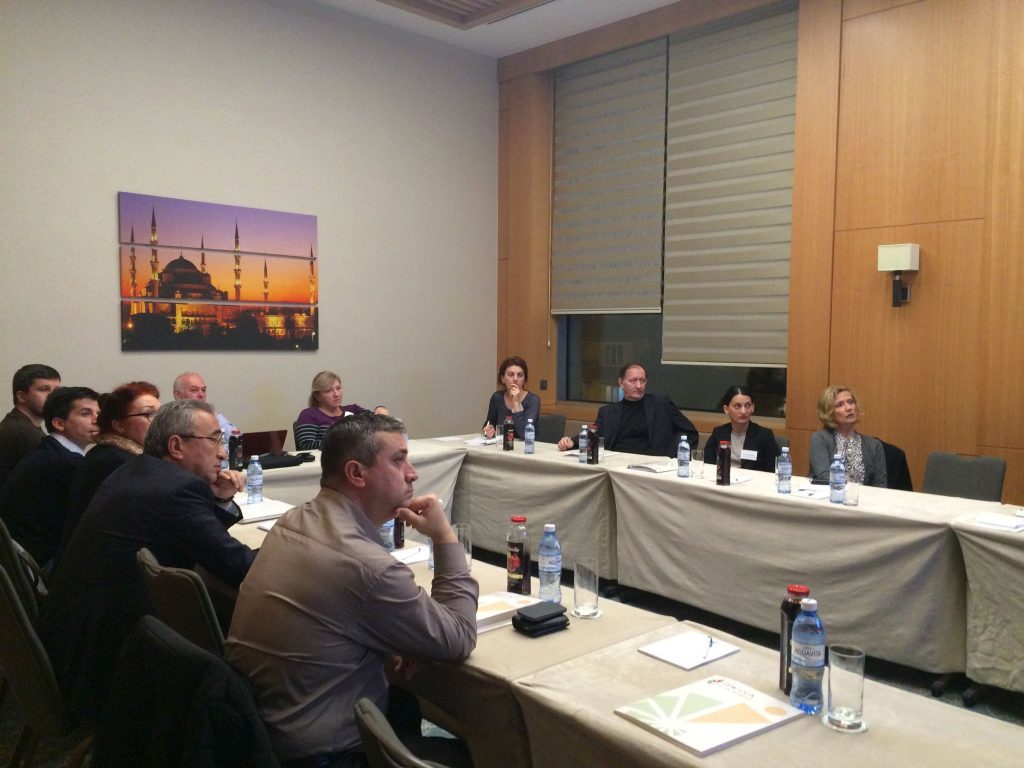
Day 1: Bilateral Meetings
The University of Bamberg, Germany, together with the International Center for Social Research and Baku State University, Azerbaijan, held the first TEW-CCA Workshop from the 27th to the 30th of November 2015 in Baku, Azerbaijan. All project members were able to participate at the event which was hosted at the Baku Holiday Inn. The workshop agenda included bilateral meetings between the Azerbaijan, German, Georgian, and Tajikistan teams, discussions regarding the institutional context of the CCA region, sessions on questionnaire design, and a policy briefing composed of regional policymakers and local actors concerned with the transition from education to work of CAA region youth.
The international and interdisciplinary team of the TEW-CCA project is composed of expert researchers from Azerbaijan, Germany, Georgia, and Tajikistan along with two young researchers and five doctoral students who represent the aforementioned countries as well as Kyrgyzstan. The researchers are specialized in fields which encompass sociology, economy, geography, psychology, social politics, and political sciences.
The first day of the workshop was dedicated to bilateral meetings which aimed to optimize the internal communication of the project. After addressing topics related to overall coordination of the ICSR office, we continued team building activities with an informal meet and greet during a tour through Baku port. Our colleagues from Azerbaijan kindly introduced the TEW-CCA team to Azeri architecture, culture, and cuisine. We sincerely thank Prof. Dr. Rajab Sattarov for generously guiding us through the city of Baku. The first day of the workshop ended with a customary meal at the Sirvansah Museum Restaurant, a very traditional restaurant with delicious Azeri food and chai as well as Muqam, classical music of Azerbaijan.
Day 2: Institutions/WP II
The second day of the workshop was dedicated to WP II “Description of Institutional Context and Reforms in the Caucasus and Central Asia”. According to the concept of the transition from education to work, formal and informal institutions affect the transition process of youth from education systems to labour markets. For this reason, the aim of WP II is to collect all relevant information on institutions that regulate transition paths of youth in general. Three presentations on institutions were held during the sessions dedicated to the institutional context of the CCA region. Prof. Dr. Subhon Ashurov gave an overview of institutions affecting the transition process of youth in Tajikistan.
The second presentation was held by the Georgia team. Nino Kobakhidze (Ph.D. candidate) gave a short overview of labour market structures in Georgia, while Rusudan Nadiradze (2nd Ph.D. candidate) presented the Georgian education system. Irina Badurashvili then explained the welfare system and features of family formation in Georgia.
Finally, Eliza Mandieva, a Ph.D. candidate from the University of Bamberg, presented the formal and informal institutions of Kyrgyzstan which affect pathways of youth in their transition from education to work.
Each presentation was followed by intensive and fruitful discussions. The relevance of specific institutions was discussed and the workshop participants agreed on which information on institutions needed to be further collected. Additional plans concerning the publication of an edited volume on CCA region institutions were also developed. The completion of the WP II is planned for July 2016.
Day 3: Questionnaire Design/ WP III
The third day of the workshop, November 29th, 2015, was devoted to WP III “Development and Implementation of the Quantitative Large-scaled Youth Surveys in Azerbaijan, Georgia and Tajikistan”. In each workshop session, Prof. Dr. Michael Gebel presented specific topics related to the draft version of the questionnaire.
This was followed by intensive discussions by country experts. Specifically deliberated was the appropriateness of each question with respect to the national context in conjunction with whether question and answer categories need to then be tailored in their wording. Additionally, the ordering of modules and questions was intensively debated.
These discussions revealed the importance of having national experts from each country to adapt the questionnaire.
Public Lecture at the Baku State University and Meeting with Azeri Youth (30 November 2015)
The Baku State University kindly organized a meeting with Azerbaijani youth in support of our project which targets youth in the CCA region. Michael Gebel had the honor of holding a public lecture on “The transition from Education to Work; Challenges for Youth” at Baku State University.
In his presentation, he outlined opportunities and challenges of youth during their school-to-work transition. Afterward, he opened the discussion-round by asking the young audience which specific challenges and opportunities youths face in Azerbaijan. This question generated the active participation of students. During the lively discussion which ensued, students mentioned the lack of internship programs as well as the incompatibility of study and work as explicit challenges of youth in Azerbaijan.
They also praised the central role of the government in the establishment of opportunities for youth which effectively facilitate their transition from education to work.
Thanks to simultaneous translation and the good foreign language capacities of many students, the intensity of the discussion was not hampered by language barriers as participants could contribute to the discussion in English, Azeri or Russian.
The meeting was closed by Michael Gebel motivating youth from Azerbaijan to follow project updates via social media and to continue providing their opinions and ideas in the future.
The TEW-CCA team thanks the Baku State University and especially Prof. Dr. Rajab Sattarov, Dr. Elmira J. Ismayilova and Mehdi Gulmammaldi for organizing this public lecture. We would like to also express our gratitude to the Baku State University students for their active participation in the discussion and for sharing their views about the transition process of the youth in Azerbaijan.
